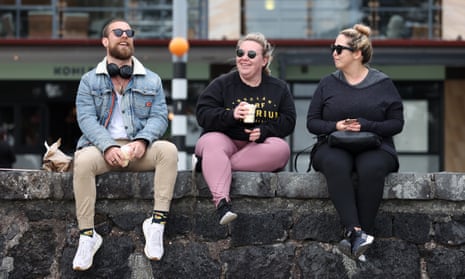New Zealand will adopt a new system of living with coronavirus from 3 December, ending tough coronavirus measures and allowing businesses to operate in its biggest city, prime minister Jacinda Ardern has said.
New Zealand has been unable to beat an outbreak of the highly infectious Delta variant of Covid-19 centred in Auckland, forcing Ardern to abandon her acclaimed elimination strategy and switch to a system of treating the virus as endemic. The country’s biggest city, Auckland, has been in lockdown for more than 90 days.
“Delta is here,” Ardern said on Monday. “I know that there will be some who may have some anxiety about these changes, but I can assure you we will continue to operate in the cautious and careful way that has served us so well … we are fast approaching the next phase in our Covid response that delivers more freedoms.”
“The number one thing every New Zealander can do to prepare for the new system is to get vaccinated,” she said.
Under the new rules, most freedoms will be available to those who are vaccinated – including visiting restaurants, bars, hairdressers and gyms, even at the highest alert levels.
The system is expected to put an end to lockdowns, and schools will remain open. For the unvaccinated, however, the changes will usher in an increasing divide – those without vaccine passes will face restrictions on gathering sizes, and will not be able to enter most hospitality businesses at higher alert levels.
Vaccine mandates will affect about 40% of the total workforce.
According to the Ministry of Health, 91% of eligible New Zealanders (those aged 12 and over) have had at least one dose of the vaccine, and 83% are fully vaccinated.
The ministry uses data of those engaged with health services, which is a slight undercount of New Zealand’s population – so true rates are likely a few percentage points behind that.
According to Stats NZ population data, 76% of the full population including children have had at least one dose, and 69% are fully vaccinated.
Vaccination rates for eligible Māori, the country’s indigenous people, are well behind the rest of the population, currently sitting at 79% first doses and 64% fully vaccinated. Experts have raised ongoing concerns that as the outbreak spreads, Māori and pacific populations will bear the brunt.
In the new “traffic light” system, regions will be put into a red, orange or green setting depending on their level of exposure to Covid-19 and vaccination rates. Auckland will start at red.
New Zealand enforced some of the tightest pandemic restrictions among OECD nations that has helped limit the spread of Covid-19 so far and helped the economy bounce back faster than many of its peers.
The country has so far reported about 7,000 cases in all and 39 deaths. Its international borders still remain shut to the rest of the world.
